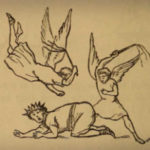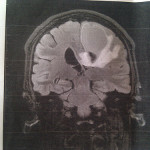We run our website the way we wished the whole internet worked: we provide high quality original content with no ads. We are funded solely by your direct support. Please consider supporting this project.

Are you Afraid of Demons?
I remember learning about germs in fourth grade. We were told our world was saturated with tiny invisible creatures that can infect wounds and make us sick. I immediately stopped sharing already-chewed gum with other kids, stop using my sister’s toothbrush and started washing my hands after going to the bathroom. Most kids had similar reactions.
But I’ll never forget how my friend Stephanie reacted. She got weird! About the only thing she ever talked about after this class was germs. We were playing badminton in gym class the next day, and she didn’t want to touch the badminton racket she was given until it was washed off. “It’s probably filled with germs,” she said. In fact, Stephanie didn’t want to touch anything that had been touched by anyone until it had been cleaned.
Stephanie had developed germ paranoia. I remember feeling bad about this, mainly because Stephanie was really cute and I had hoped to recruit her to join in a delightful but germy game some of us had recently discovered called spin-the-bottle. Now that Stephanie had become a germ freak, I realized this was probably never going to happen.
Experience has taught me that a certain percentage of people react to the teaching that the world is populated with hostile demons the way Stephanie reacted to the teaching about germs. They become demon paranoid. They fearfully obsess on the topic and tend to see a demon behind every headache, sneeze or computer glitch.
This is obviously not a sound biblical response. Despite the fact that Jesus and his disciples certainly believed the world was oppressed with evil forces, they exhibited a complete freedom from fear in regard to such entities. In fact, the fearlessness of the early Christians was one of the chief “selling points” of early Christianity, since most people in the ancient world lived in fear of demonic forces.
The reason the early church was so free from fear was because, as powerful as they knew the fallen powers to be, they were perfectly confident that Christ was far stronger and that he had in principal defeated the powers on Calvary. They knew that Jesus came to destroy the devil and his works (Heb 2:15; 1Jn 3:8) and to thereby set people free from any fear of the devil. The early Christians knew that in Christ all their sins had been nailed to the cross and that this meant the powers have been disarmed and made a laughingstock (Col 2:13-15). They knew that they were “in Christ,” and Christ was seated “far above all rule and authority, power and dominion, and every name that can be invoked” (Eph 1:21). They were confident that the one who resided in them (the Holy Spirit) was more powerful than the one who was “in the world” (1 John 4:4). And they knew that, as powerful as the fallen powers may continue to be, they could not separate disciples from the love of Christ (Rom 8:38-39).
The cure for demon paranoia is not to pretend the world isn’t populated with demonic forces, anymore than the cure for Stephanie’s germ paranoia would have been to deny the pervasive reality of germs. You never improve things by denying reality. To the contrary, the cure for demon paranoia—or germ paranoia—is to broaden your understanding of reality.
Yes, germs are everywhere. But they are not usually life-threatening, and there are simple things you can do to protect yourself against them. It’s important to know about them, but never appropriate to obsess on them. So too, it’s true that hostile demonic forces populate our environment. But for people who have made their life a domain in which God reigns, these forces can’t ever threaten the life we have in Christ — the only life that really matters to us. And there are simple things we can do to protect ourselves against these forces. It’s therefore important to know about demonic forces, but never appropriate to obsess on them.
The main thing believers need to do to counteract demonic forces is to simply remember who they are in Christ. In Christ, we have not been given a spirit of fear, but of power, love and self-control (1 Tim 4:7). In Christ, we are seated far above all rebel powers (Eph 2:6). In Christ, we have the same authority to vanquish evil powers that Christ had himself (Luke 10:19-20).
If we remember who we are in Christ, we have nothing to fear. Instead it’s the demonic forces that fear us. We are the aggressors who are breaking down their defensive gates, not the other way around.
Image by B Rosen via Flickr
Category: General
Tags: Demonization, Demons, Fear, Spiritual Warfare
Topics: Spiritual Warfare, Cosmic Conflict
Related Reading

Can a Christian be demonized?
I along with most evangelical scholars and pastors do not believe it possible for a Christian to be “possessed” by a demon or by Satan. Christ in principle defeated Satan, and all who are “in Christ” share in this victory (e.g., John 12:31; Col. 2:13–15; 2 Thess. 3:3; Heb. 2:14–15; 1 John 5:18). Colossians 1:13…

What Does Paul Mean that We Will Judge Angels? (podcast)
Greg considers Paul’s claim that Christians will judge angels. Episode 498 http://traffic.libsyn.com/askgregboyd/Episode_0498.mp3

Terror in the Night
I’ll never forget the night it first happened to me. I was thirteen, sharing a bedroom with my older brother. I woke up in the middle of the night and felt as if something was pinning me to the bed, choking me, and electrocuting me, all at the same time. The wind was blowing through…

Book Review: Understanding Spiritual Warfare: Four Views
I just got the pre-release copy of Understanding Spiritual Warfare: Four Views, edited by my friends James Beilby and Paul Eddy (IVP, 2012). The introduction alone is worth the price of the book! It is the clearest, most comprehensive, yet most succinct overview of the concept of spiritual warfare throughout church history that I’ve ever…

Why Did God Heal or Not?
In 1996 a 27-year-old man in my church named David was diagnosed with an inoperable brain cancer. The doctors decided to send David to the Mayo Clinic to receive some experimental treatments on the slim hope these might at least prolong his life. The night before David left, I and a dozen other people went…

What To Do with the Bible’s Talk of Satan
Recently, Roger Olson raised the question on his blog about why Satan is ignored in modern theology. He observed how Greg’s theology takes an “obvious, ‘up front,’ blatant belief in a very personal, very real, very active Satan who has great power in the world.” Because we often have so little to say about Satan…
